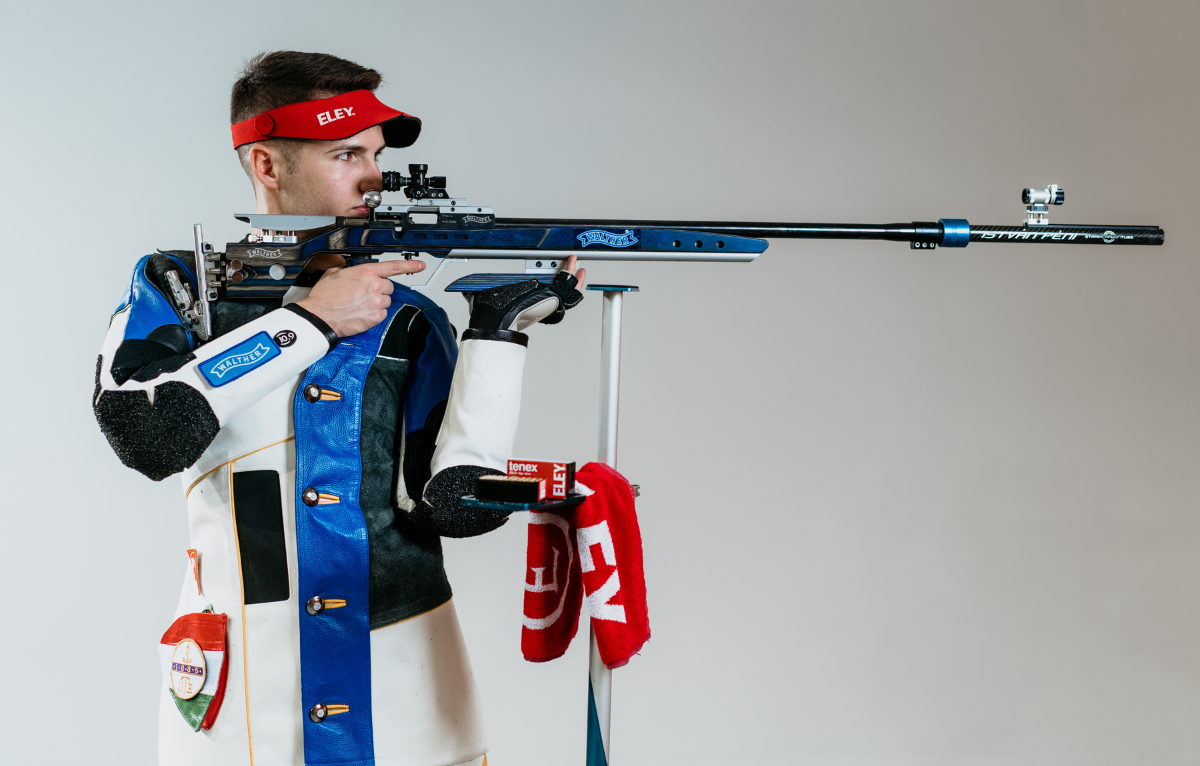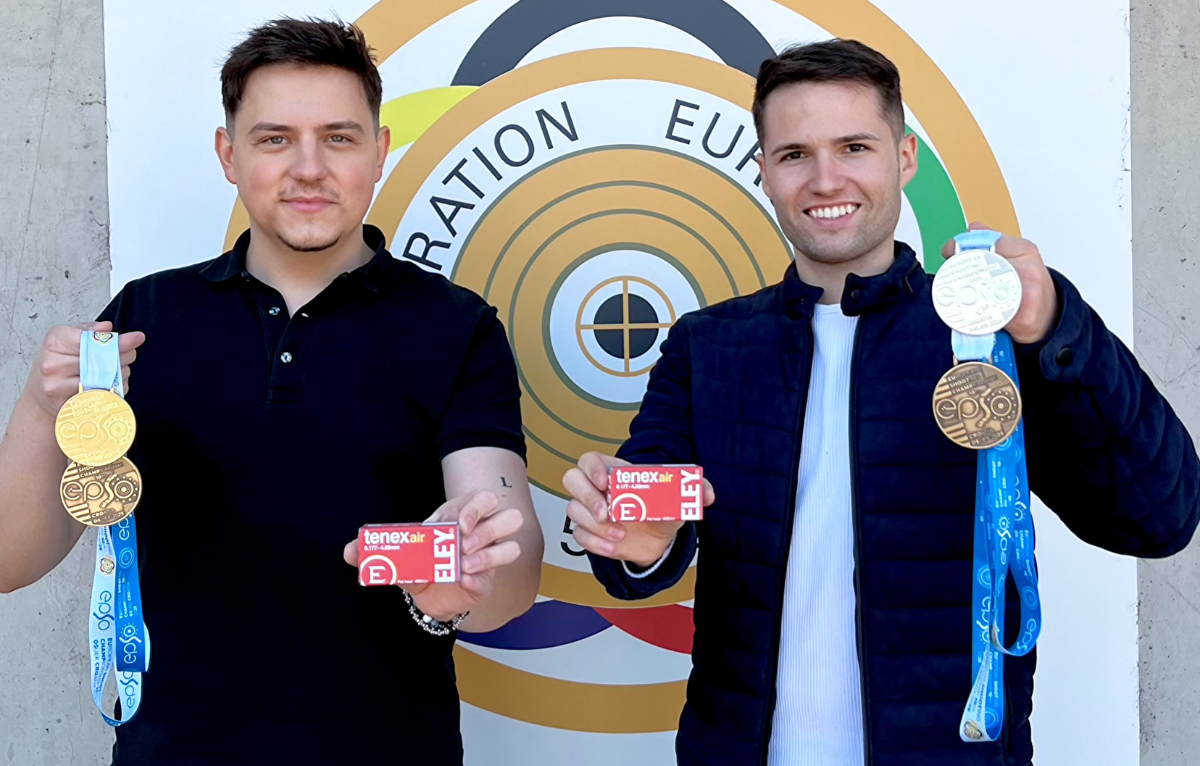teamELEY and Hungarian Shooting Sports Athlete, István Péni visited ELEY HQ last week for .22LR batch testing. We gave followers the chance to ask him anything!
1. What kind of shooting practice and physical training do you usually do?
“My days usually start at 7:30 with a physical training session. We mainly focus on core strength, balance, and coordination. After that, I head to the range around 9:30 and spend about 5–6 hours training. I often practice both 50m and 10m in the same day, including shooting matches and technical drills to improve specific aspects of my technique.”
—
2. Is it a God-given talent, or were you also hitting 9s when you started?
“I’d be lying if I said I wasn’t talented from the beginning. My scores improved quickly, and I soon found myself shooting better than others in my club. I competed in my first ISSF World Cup at 14. That said, the journey hasn’t been without challenges. One common struggle for young shooters is adapting to physical changes during growth. I’ve had tough moments, and I still do at times—but I always try to respond by working harder. Usually, a new success comes that makes it all worth it.”
—
3. Do you have any training methods that might help my shooting?
“It’s hard to name one magic method, but building a stable position is key. If something feels off—if there’s discomfort, tension, or a strong pulse—you should experiment and look for a better setup. Watch ISSF finals, study what top shooters are doing, and try adapting what fits you. SCATT can also be a great tool to track whether you’re moving in the right direction. But the most important thing is consistent, purposeful training. Believe in the process!”
—
4. How many hours a day do you train at the range?
“Usually 5–6 hours a day, but it depends on the phase of the season. Closer to competitions, I focus more on quality over quantity. In preparation phases, I increase the volume.”
—
5. What are the pros and cons of your dad being your coach?
“Honestly, there aren’t many cons. My dad is my biggest supporter, and I trust him more than anyone. He’s incredibly calm and kind, and I really appreciate his relaxed attitude. If I had to mention one funny downside—it’s that we often share a room while traveling, and I always need earplugs to sleep.”
—
6. When did you begin air rifle shooting?
“I started in 2008, when I was 11. That’s a good age to begin, and in Hungary, we all start with air rifle.”
—
7. I can’t control my nerves during a final. Do you have any tips?
“Breathing and meditation techniques can really help. One simple method I recommend is box breathing—it’s easy to learn and effective for calming your nerves and refocusing between shots.”
—
8. How do you train your mind to stay focused during high-pressure competitions?
“Similar to the previous answer—breathing techniques and staying present help a lot. I also use mantras and try to visualize a positive outcome. That mindset keeps me grounded.”
—
9. Do you have any pre-competition routines or habits that help you get in the zone?
“Yes, routines are very important to me. They start the day before a competition—with dinner, the amount of sleep I get, when I wake up, what I eat for breakfast, and how I warm up. I try to arrive at the range with enough time so I don’t feel rushed. Over the years, I’ve developed a routine that works for me, and I continue refining it.”
—
10. How do you handle setbacks or disappointing performances?
“They usually motivate me to train harder. If I’m not happy with a performance, you’ll definitely find me at the range the next day working to fix what went wrong. But I also understand that setbacks are part of the sport—we’re all human. With consistent effort, the good results always come back.”
—
11. What hobbies or activities do you enjoy outside of shooting to relax?
“I love being outdoors. I enjoy hunting—not necessarily for the shooting part, but for the time spent in nature with friends. I also really like fishing, especially for pike.”
—
12. Have you ever done any other sports?
“Yes, I played football from age 4 to 12. I really loved it, but unfortunately, I injured my knees. That injury led me to shooting—so in a way, it opened a new door for me.”
—
13. What does your 10m air rifle SCATT look like?
“It’s generally good. Of course, a clean SCATT trace usually means better scores, but it’s not the only factor. Some shooters obsess over the speed of their movement, but it’s more complex than that. There’s a connection between SCATT data and performance, but it’s not a guaranteed formula.”
—
14. How do you balance training for both 10m air rifle and 50m 3P?
“It depends on the time of year. In winter, I focus more on-air rifle; in summer, more on 50m. I try to maintain both regularly. It’s a lot of work to stay at the top level in both disciplines.”
—
15. Are air rifle and 3P trainings different?
“I do some similar drills, but 3P definitely requires more. Three positions mean triple the preparation!”
—
16. What does your daily schedule look like during a busy competition season?
“* 7:30–8:30: Physical training
* 10:00–13:00: First shooting session
* 14:00–17:00: Second shooting session
Most days follow this pattern, but after a competition I usually have a rest day or a lighter training day.”
—
17. What is your mindset before finals?
“I just focus on believing in a positive outcome. That’s the main thing.”
—
18. How many shots do you usually fire during training?
“Between 150 and 300 shots, depending on the day.”
—
19. How do you deal with anxiety during finals?
“Positive mantras help me a lot. I repeat them to myself to stay calm and focused.”
—
20. Any plans on coaching?
“Actually, I already have a coaching certificate and sometimes I help other shooters. Recently, I worked with one of the top Indian 3P athletes, and I really enjoyed it. I can definitely imagine coaching more in the future.”
—
21. Have you ever changed your technique?
“Not much, to be honest. I had a great coach from the start, and we built a solid foundation. I’ve mainly focused on refining what I’ve learned. But when something clearly didn’t work, we adjusted it. I do believe in change when it’s needed—sometimes a small change can help break through a plateau.”
—
22. Tips for overcoming a bad shot in competition?
“Just focus on the next shot. That’s what I keep reminding myself.”
—
23. Shooting demands intense concentration. How do you reset if you lose focus mid-competition?
“It’s important to recognize when your focus drifts, then use techniques to bring yourself back—like breathing, rhythm, or simply trusting your muscle memory. A good pace helps too.”
—
24. What does a perfect shot feel like?
“Like taking a bite of your favourite pizza slice by the sea. 😊
It’s when everything lines up: smooth approach, clean trigger pull, good follow-through—and in 50m, if I’ve also read the wind correctly, it’s even more satisfying.”
—
25. How much of your success is mental vs. physical?
“I’d say it’s 50–50.”
—
26. What was the breakthrough moment that made you believe you could be a champion?
“I’ve always been very competitive. It’s just part of who I am. I work hard to be good, I love to win, and I always strive for that.”
—
27. If you could give your younger self one piece of advice, what would it be?
“Enjoy the moment. The journey itself is the most beautiful part of sport.”
—
28. What keeps you hungry to keep competing?
“I simply love shooting. It’s my passion. And I’m very aware that many people are supporting me and working hard behind the scenes—so I want to give my best and make them proud.”
—
29. Do you have a favourite medal or performance?
“My favourited experience was the Youth Olympic Games in Nanjing. It was all about sport, and I met so many athletes from my country—we really felt like a team. Another favourite was winning my first senior European Champion title. It was the result of a well-planned and professional preparation. Everything just came together perfectly.”
—
30. What’s your favourite country to compete in?
“India! I’ve won a lot of medals there—12 ISSF World Cup and World Cup Final medals, plus my Olympic quota for Tokyo.”
—
31. Do you prefer hot or cold climates for training and competition?
“I prefer cooler conditions. My ideal weather is like a Hungarian autumn: 15–20°C, cloudy with diffuse light, no wind—maybe even a light drizzle. That’s when I feel I can shoot my best.”
—
32. Do you do any gym or fitness work?
“Yes, I run and go to the gym regularly. Most of my training focuses on bodyweight exercises for coordination, balance, and core strength.”
—
33. How many days a week do you train?
“Usually 4–6 days a week.”
—
34. What’s been the most rewarding part of being an Olympic athlete?
“Representing my country at the highest level is something I’m very proud of. The daily dedication, the support from my family and team, and the moments when everything clicks—those are truly rewarding. And inspiring young athletes, just as I was once inspired, is a special feeling.”
—
35. If you were to write a book about your career so far, what would the title be?
“Hmm… I haven’t thought about that yet. I’m open to suggestions!”
—
36. Who have been the most influential people in your life?
“My grandfather, my coaches, and some key mentors. I’ve learned so much from them.”
—
37. Have you ever considered doing something else?
“Plans can always change, but right now I enjoy shooting. I want to keep doing it as long as I’m performing well and still hungry to win. I do have a degree in economics and worked for a while at an airline as a network developer. It was nice to see some of the routes I helped plan actually succeed! But my heart is in shooting, and I want to give back to the sport.”
—
38. Do you have short- and long-term goals?
“Yes! My short-term goal is to reach the podium at this year’s World and European Championships. My long-term goal is to have a bit more free time. And my ultimate goal is to become an Olympic Champion—hopefully in LA 2028.”
—
39. What’s the hardest part about balancing life as an elite athlete?
“Honestly, there’s no real balance. My career is my daily life. Almost everything revolves around it.”
—
40. How do you stay motivated during the off-season or quieter periods?
“Motivation comes naturally to me. I’m always striving to improve and win. I also have a very intense schedule in general, so there’s rarely a quiet moment.”





